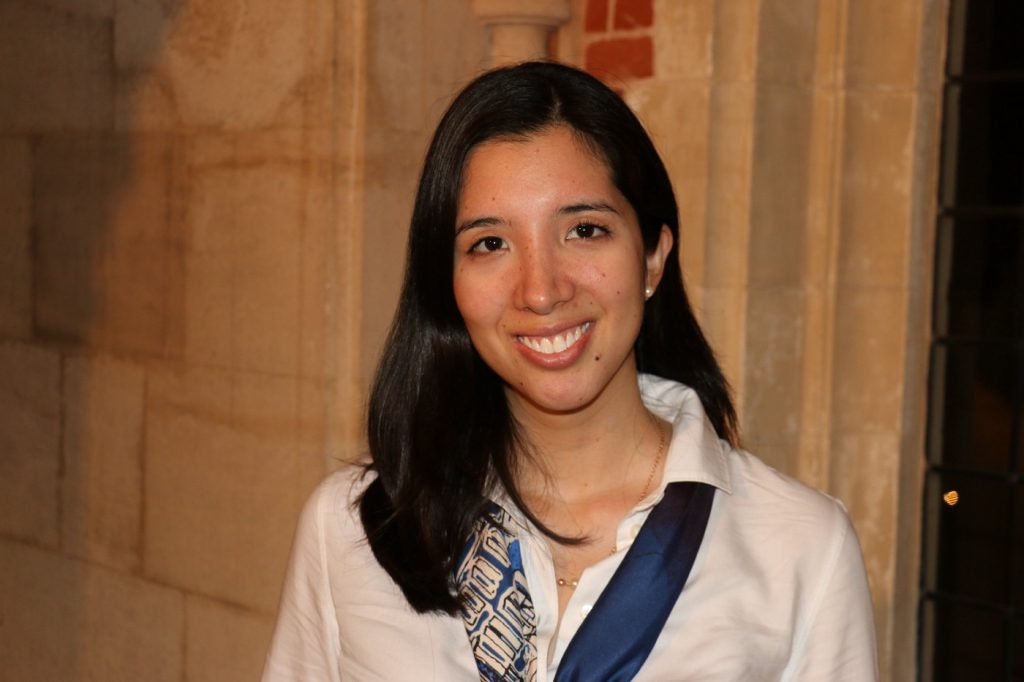‘To me, Clare Hall can be described in one simple word: home’
Daniella Salazar Herrera, a recent MPhil graduate in Development Studies, offers a glimpse into her role at the UN’s Food and Agriculture Organisation, and shares how the pandemic has impacted her work

I was born and raised in Lima, Peru — a city that is characterised by its huge inequalities, where the divide of wealthy and underprivileged communities is easily seen and contrasted in a 15-minute drive.
These stark inequalities sparked my interest in the politics behind them, and the overall concept of Human Rights as an entitlement rather than as an aspiration. This interest led me to major in Political Science and Human Rights at Trinity College, Connecticut, USA. After my undergraduate degree, I went on to work at the Food and Agriculture Organisation (FAO) of the United Nations, where I focused on the overlap between rural development and natural resource management — especially the Fisheries and Aquaculture sector. After two and a half years there, I came to Cambridge to do an MPhil in Development Studies from 2019–20.
My current role is as a Social Protection Consultant, working on the fisheries and aquaculture sector.
In this role I am also the lead consultant for the Social Protection in Fisheries and Aquaculture Project (SocPro4Fish), and I am the alternate lead of a cross-divisional Task Force on Economic Inclusion within FAO. Within this role, I support policy and programmatic work on social protection and economic inclusion, accounting for its linkages with natural resource management and climate change in the fisheries and aquaculture sector, and conduct research to foster knowledge production. One of the main challenges in the work is the lack of socio-economic data in the sector — particularly the lack of data showing the gaps in the availability and access of social protection by fisherfolk. Amongst the things that I enjoy most are working directly with countries to support them in advancing the social protection agenda in the sector, conducting research, and working my colleagues, from whom I learn so much.
the College made so many efforts to foster a sense of community and belonging amongst its members

The biggest impact that the pandemic has had on my day-to-day work has been the fact that we can’t go into the office.
For us, the office is or was a space for constant collaboration and that fostered synergies. While we have adapted through the use of online platforms, such as Zoom and Teams, personally I think it is not the same. Additionally, we used to conduct missions to countries to, for instance, conduct capacity building activities and host meetings with our counterparts. While this has changed our way of working, it also has allowed for more open and frequent communication with country offices and counterparts, through online means.
I would like to continue pursuing a career in the policy arena, supporting countries and key stakeholders to achieve rural development and extend social protection, through policy work and knowledge generation.
I also hope to pursue a PhD to better understand the political economy of social protection schemes, and to contribute to the epistemic community. I am also looking forward to resuming travelling once the pandemic is over, with the hopes to be able to conduct missions, field research and better understand the role of local communities in development processes.

To me, Clare Hall can be described in one simple word: Home.
Before and through the challenging times posed by 2020, Clare Hall always felt like home to me, from the moment I stepped onto the college grounds. I vividly remember arriving at Clare Hall alone, struggling to carry my eight bags, when one of the Porters, Kevin, offered to help me even though he didn’t have to. Smalls gestures like this one, or the fact that the Porters and everyone else working at the College would make an effort to learn our names and stories, made a world of difference and are what makes Clare Hall so special. The College made so many efforts to foster a sense of community and belonging amongst its members. I remember feeling proud of bringing my grandparents when they visited Cambridge and my friends from other colleges to Clare Hall for lunch, tea, formals, or to study because it was like bringing them home. My friends especially would always want to come because they felt very welcomed by everyone (and because we had the best food in all of Cambridge!)
If you’re a prospective student, learn more about the University of Cambridge’s MPhil in Development Studies at https://www.devstudies.cam.ac.uk/studywithus/mphil-in-development-studies